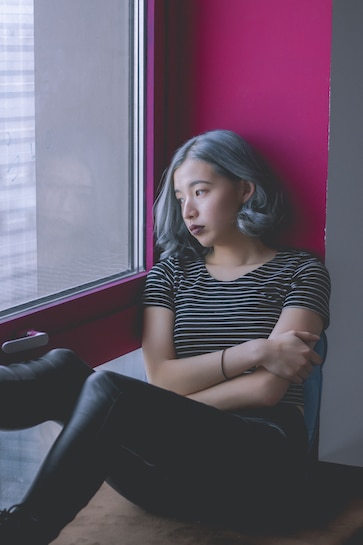


Dealing with General Anxiety Disorders or Panic Disorders can be overwhelming, often leaving those with the disorders feeling powerless over their condition. We’re often told breathing and meditative techniques can help us persevere. Unfortunately, for many of us, this precept doesn’t always help the way we would like it to.
D’Amore’s nationally recognized, licensed Orange County, California Residential Psychiatric Facility provides a long-term answer with comprehensive treatment plans for those with anxiety disorders. Together we can work to understand the complex root of what is causing anxiety in your life and establish an approach that brings you comfort. Our soothing environment is the perfect place to practice therapeutic techniques and find relief, bringing joy and hope back into your life.

D’Amore Healthcare’s dual-diagnosis mental health treatment center for men and women in Orange County, California, has a multitude of personalized approaches for each individual patient we treat. A few of our specializations are the intervention, acute stabilization, and residential treatment of anxiety and panic disorders.
A combination of treatments is often the most effective approach to mental disorders. These combinations may include psychotherapy, medications, and lifestyle adjustments.
First-line treatment for anxiety is psychotherapy, also known as “talk therapy.” There are countless different approaches to therapy, though to a degree they all focus on awareness, acceptance, and making healthy adjustments.


A number of medications may be prescribed for short-term or long-term plans. Medication can often improve the effectiveness of psychotherapies, allowing one to more easily consciously work through problematic situations.
increase serotonin levels, potentially improving a range of symptoms related to mood.
Are FDA-approved for depression, though they can be effective for panic disorders and social phobia when used off-label.
Can be used long-term and short-term, helping regulate mood, though it is less effective for severe anxiety.
can reduce stress and anxiety by producing feel-good chemicals called endorphins.
can sometimes help people reduce anxiety.
can improve your overall health and well-being.
can bring your focus off of whatever is causing anxiety.

Generalized Anxiety Disorder (GAD) is characterized by chronic anxiety and excessive worry, especially in situations that do not necessitate a fearful or nervous reaction. This can interfere with daily activities and often focus on everyday things, even minor matters.
Panic disorder is characterized by reoccurring, unexpected episodes of intense fear coupled with heart palpitations, chest pain, dizziness, shortness of breath, and abdominal pain. Some people mistake Panic symptoms for Heart Attacks. Because of this, a full medical screening is often necessary to rule out other causes, unrelated to anxiety.
Phobias are persistent and excessive fears of a specific thing that isn’t generally threatening. Even if patients know their fears are unreasonable, they can still have a hard time overcoming them. People with phobias typically go to great lengths to avoid whatever is causing them anticipatory anxiety. There are countless numbers of phobias, but common ones are agoraphobia (fear of specific places they cannot easily escape), arachnophobia (fear of spiders), etc.
Social Anxiety Disorder (previously known as social phobia) is characterized by enduring significant anxiety about possibly being humiliated, embarrassed, or rejected upon social interactions. Because of this, people with social anxiety disorder may avoid situations such as public speaking, meeting new people, or doing other things in public.
Separation anxiety disorder is defined by fear of being separated from someone whom a person is attached to. This type of behavior is seen in children and their parents. However, this disorder is only diagnosed when these feelings become inappropriate to one’s age. A person with separation anxiety may constantly be worried about losing a specific loved one, refuse to sleep without them near, or have nightmares of that person leaving them.
Anxiety isn’t always experienced the same way by everyone. However, each anxiety disorder produces similar symptoms and signs. Typically, symptoms of anxiety start small and gradually worsen unless the person with them get treatment or actively works on their condition. For example: what can begin as excessive worry about grades in high school can grow into a fear of crowds later in life.




If you or a loved one are experiencing some of these symptoms, you should talk to your doctor about them. Your doctor can perform an exam and examine your health history to ensure that an unrelated condition is not causing these symptoms.
It’s not easy helping a friend or family member who is living with anxiety or panic disorder. Sometimes even bringing up the topic of their health can trigger a person with an anxiety disorder and cause them even more stress. When dealing with a loved one with an anxiety disorder, it’s important to keep in mind that they are often experiencing things that trigger their fight, flight, or freeze response. In this heightened mindstate, it can be difficult for them to see things in the way you do. Remember that their mind works in a different way than yours does.
Learn as much as possible about the specific form of Anxiety Disorder that your loved one is diagnosed with.
Participate in exercise classes, breathing exercises, or meditation with your loved one.
Don’t encourage or enable “Avoidance Behavior.” Avoiding things that you are worried about doing, like making an important phone call or going to the doctor, just make anxiety worse.
Try to de-stigmatize the symptoms of anxiety. The fear of having a panic attack, trembling, or sweating in public can be so stressful that it can make these symptoms worse. Help your loved one get through these things calmly by knowing how to cope with these feelings.
Have boundaries and encourage them to talk to their therapist or psychiatrist. Some people with anxiety disorder need constant reassurance. You should be supportive, but some things are best left to the professionals.
Medication or psychotherapy is a reasonable initial treatment option for GAD. Though you may benefit most from a combination of the two. A high degree of treatment is available for generalized anxiety disorder.
Anxiety occurs when the amygdala, senses trouble. When it senses threat, real or imagined, it surges the body with hormones (including cortisol, the stress hormone) and adrenaline to make the body strong, fast and powerful.

Jamie Mantel is a Licensed Marriage and Family Therapist, with a Psy.D. in psychology. Jamie has worked for non-profits for over 20 years working with agencies, as well as her private practice in Huntington Beach, California.